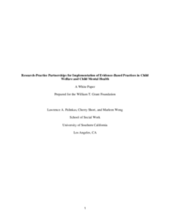This paper addresses the disconnect between research and practice in regards to child welfare and child mental health services in the US. The paper acknowledges that, while studies point to the efficacy of particular therapeutic and other interventions for children, often times children in need receive services that are not evidence-based, which may actually cause more harm than good, and lack access to evidence-based services.
The aim of this paper is to provide an overview of research-practice-policy partnerships for child welfare and child mental health, identifying the core elements of successful partnerships, and presenting recommendations on how to develop and maintain such partnerships. The paper describes three different models of effective partnerships in child welfare and child mental health. It is intended for researchers, practitioners, and policymakers alike who are need of advice on how to develop, utilize and sustain such partnerships.

